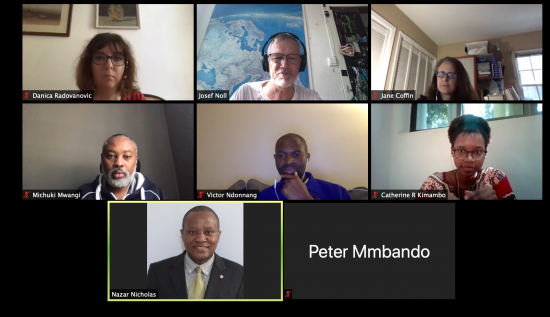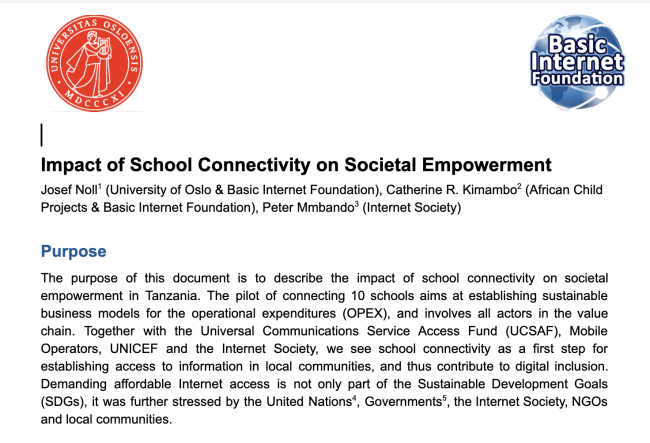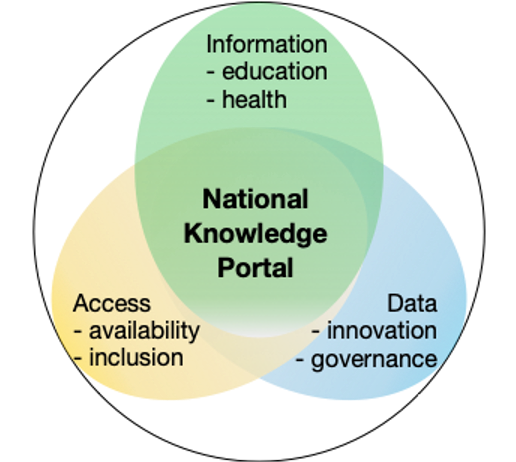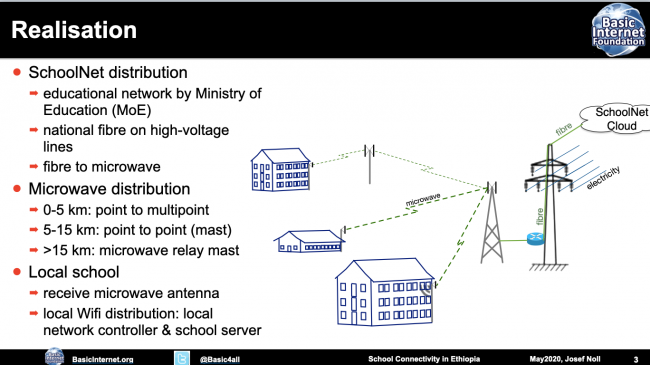BasicInternet:InternetSociety-BasicInternet Jul2020
From its-wiki.no
| InternetSociety-BasicInternet Jul2020 | |||||||
|---|---|---|---|---|---|---|---|
|
BasicInternet:InternetSociety-BasicInternet Jul2020
| Title | InternetSociety_TZ-BasicInternet_Jul2020 |
|---|---|
| Place | Zoom.us |
| Date, Time | 2020/07/31, 1500-1600h Oslo time |
| Contact Person | Nazar Nicholas |
| Participants | Josef Noll, Jane Coffin, Danica Radovanovic, Catherine R. Kimambo, Michuki Mwangi, Victor Ndonnang, Peter Mmbando, Nazar Nicholas |
| related to Project | BasicInternet |
| Keywords |
Contents
- 1 BasicInternet:InternetSociety-BasicInternet Jul2020
- 2 Purpose
| this page was created by Special:FormEdit/Meeting, and can be edited by Special:FormEdit/Meeting/BasicInternet:InternetSociety-BasicInternet Jul2020 |
| Category:Meeting |
Purpose
The purpose of the meeting was to discuss the following topics
- Lessons learned from DigI project
- School connectivity project in Tanzania (TZ), pilot to establish sustainable business models
- Public Internet at 12.468 locations in TZ
- National Knowledge Portal for TZ
- Fibre over power power lines
As outcome, we agreed to
- work together on the SchoolConnectivity pilot, with kick-off 5Aug2020 (see point 2)
- create an MoU on the collaboration for "connecting the unconnected" in TZ (see points 2 & 3)
- establish an information page on Internet over high-voltage power line (ActionItem Josef, point 5)
1. Lessons learned from DigI project
The "Non-discriminating Access for Digital Inclusion" is a 4 year project addressing health information in rural Tanzania through InfoSpots with digital health messages.
- Read more on Achievements in the DigI project
- See presentation on achievements through Digital Health Promotion (DHP): Free_access_to_digital_health_information-results_2019/10/25
2. School connectivity project in Tanzania (TZ)
On 5Aug2020 is the kick-off in connecting 10 schools in Tanzania.
- pilot to establish sustainable business models
- see DigI:SchoolConnectivity_Pilot_TZ_kick-off
Special focus is on sustainability, and a solution that addresses OPEX costs as little as 15-20 USD/month for the connectivity. Please read more in our paper on Impact of school connectivity, the business model for "minimum connectivity" - the SchoolConnectivity project in TZ is going to collect data used for the envisaged 3 models on sustainable connectivity
3. Public Internet at 12.468 locations in TZ
The Internet Society, Chapter Tanzania, aims at connecting 12.468 locations within the next 10 years. The public Internet access hot-spots, together with Innovation hubs, will be established in 200 underserved cities and 12.268 villages. Two pilot installations are currently established, one being at the Barack Obama Avenue. The hot-spots include
- partnership between e.g. City of Dar es Salaam, operators, TV broadcasters,..
- an innovation hub focussing on new businesses
- a place for income from other sources
Early operation is based on a 6 months voucher for users, and then turn into payed access
4. National Knowledge Portal for TZ
A National Knowledge Portal combines three aspects (see Figure 3), all being central for the empowerment of societies:
- Knowledge distribution for education, health, governmental information, as well as digital public goods. As an example, the portal may hold courses to acquire digital skills, and handle certificates for the educational sector.
- Data governance and innovation of national data is the core for value creation within the country. “Data is the new oil”, this statement of Telenor’s CEO Sigve Brekke demonstrates the value of data, and the need for building the economy around these national data.
- Inclusive access to the National Knowledge Portal is an easy way ahead for regulations. License conditions for Internet Service Providers (ISPs) and Mobile Operators could include the “free access to the National Knowledge Portal” as a prerequisite for a license.
Read more and have a look a the presentations...
5. Fibre over power power lines
The concept of distributing Internet over high-voltage lines to remote areas is based on a fibre cable being enclosed in the cable on top of a high-voltage power mast. In Europe, electricity companies own that fibre, and use it for communication regarding the electricity network. In Ethiopia, the government has connected the fibre to the national SchoolNet, and envisaged school connectivity in using the fibre. The idea is to
- take the fibre down in regional villages
- add a fibre to radio gateway
- distribute the Internet over radio through dedicated or shared radio links reaching out to the schools
Read more on Internet over High-Voltage Power Lines (to be estalished).
Background information and links
- About BasicInternet: https://BasicInternet.org
- Similar challenges in school connectivity around the globe: Meeting_with_the_Mexican_Embassy_in_Oslo
- Sustainability in school connectivity: DigI:TZ-Sustainability_SchoolConnectivity_Feb2020, addressing max OPEX of 20 US$/month
- Health information through local informationSpots hosting Yeboo.com in the villages: https://izazi.yeboo.com/health_information_dashboard.php
- Contribution to 6G discussions on sustainability: Media:202003_6G_DigitalInclusion_Noll.pdf
Technology and Solutions
- Activities in countries, see: DigI:Villages
- Basic Internet Solutions including 3 elements, see BasicInternet:Solutions
- Addressing the challenges of "no mobile network", e.g. tower more than 20 km away (Selela), hidden behind a mountain ridge (Izazi) - https://basicinternet.org/connected-villages-tanzania/
- contribution to standards: Sudhir Dixit - IEEE Connect the Unconnected
Skills and empowerment
- Hackathon on Community networks and Sustainability, see DigI:TZ-Hackathon_Feb2020
- Our local champion: Catherine R. Kimambo - https://vimeo.com/368147538
- Connecting to Dorca Muthoni and http://www.afchix.org/
- Opening for link to investors related Women Entrepreneurship Media:Women_Entrepreneurship-AIW_30.10.2019c.pdf




